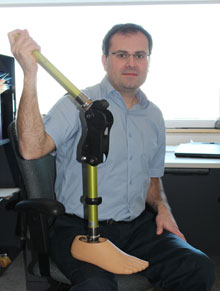
Andrysek plans to use the $100,000 grant to further test the LC Knee in developing countries. Photograph courtesy of Jan Andrysek and Holland Bloorview Kids Rehabilitation Hospital.
Canadian scientist Jan Andrysek, PhD, PEng, has been awarded a $100,000 grant to continue innovation on an inexpensive and functional prosthetic knee joint for transfemoral amputees in developing countries.
His design is called the Low-Cost Prosthetic Knee Joint (LC Knee) and is made almost entirely of injection-molded thermoplastics, which could be mass-produced using injection-molding techniques for about $50-$100 a knee. A key component of the prosthesis is the knee mechanism that functions much like the human joint in that it automatically locks and unlocks itself based on how the user bears weight. Because it is made of plastic, the LC Knee is waterproof. Andrysek said he also designed it to be sturdy, comfortable, and long-lasting.
“The mechanisms and technologies used are based on designs from post-World War II,” said Andrysek, a research scientist at Holland Bloorview Kids Rehabilitation Hospital, Toronto, Ontario, Canada, and an assistant professor at the Institute of Biomaterial and Biomedical Engineering, University of Toronto. “They have not changed in 50 years.”
Andrysek is one of 15 Canadian researchers who received $100,000 grants from Grand Challenges Canada. The money is to be used to help get innovative health solutions to people in the poorest regions of the world. Researchers whose ideas prove successful are eligible for an additional $1 million to help get their innovation to the people who need it most.




